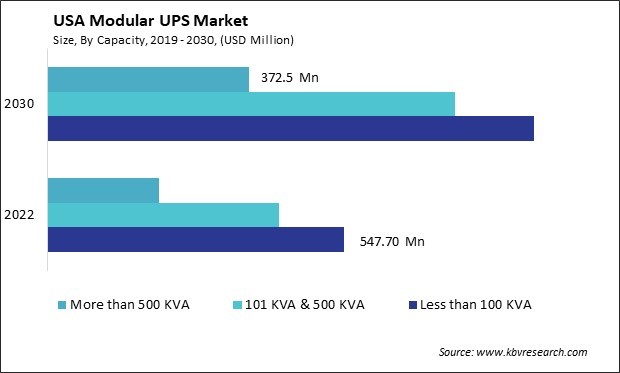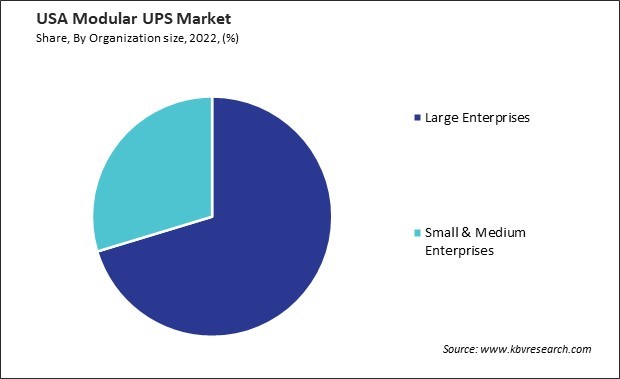The USA Modular UPS Market size is expected to reach $2 billion by 2030, rising at a market growth of 7.1% CAGR during the forecast period.
The modular UPS market in the United States has witnessed significant growth in recent years, driven by the increasing demand for reliable and uninterrupted power supply (UPS) across various industries. One of the key factors contributing to the growth of the modular UPS market in the U.S. is the rising awareness of the importance of uninterrupted power supply in critical applications. As businesses become increasingly dependent on digital technologies and sensitive electronic equipment, reliable power protection has become paramount. Modular UPS systems address this need by providing a modular architecture that enables easy expansion and upgrades to meet the evolving power requirements of these applications.

The modular UPS market in the U.S. is experiencing a significant surge in adoption, propelled by the growing emphasis on renewable energy sources. Companies increasingly recognize the environmental and cost benefits of integrating renewable energy into their power infrastructure. With their scalable and flexible designs, modular UPS systems align seamlessly with the decentralized nature of renewable energy installations. This trend is driven by a dual commitment to sustainability and resilience, as businesses seek to reduce their carbon footprint while ensuring reliable and uninterrupted power supply. The modular UPS market is thus becoming a key player in advancing the transition to green energy in the U.S.
According to the U.S. Energy Information Administration, in 2022, about 4,231 billion kilowatt-hours (kWh) (or about 4.23 trillion kWh) of electricity were generated at utility-scale electricity generation facilities in the United States. The U.S. Energy Information Administration estimates an additional 61 billion kWh of electricity generation was from small-scale solar photovoltaic systems in 2022. This remarkable shift mirrors the burgeoning acceptance of sustainable practices, particularly evident in the modular UPS market. The escalating reliance on clean energy sources within the U.S. underscores a parallel uptick in integrating renewable solutions, steering the modular UPS market towards a more environmentally conscious and resilient future.
The modular UPS market in the United States is experiencing a significant surge in demand, driven primarily by the increasing need for zero power downtime across various sectors. As businesses and critical infrastructure sectors rely more on uninterrupted power supply, the modular UPS market has emerged as a key solution to address this imperative requirement. The critical nature of operations in sectors is the primary factor fueling the demand for modular UPS systems. In healthcare, for example, where patient care and life-saving equipment rely heavily on a continuous power supply, any downtime can have severe consequences. Similarly, financial institutions and data centers handling sensitive information and transactions cannot afford interruptions in their operations.
Moreover, the modular UPS market in the U.S. is witnessing a surge in demand from organizations prioritizing reliability and resilience in their power infrastructure. The modular UPS systems offer a scalable and flexible solution, allowing businesses to expand their power protection capabilities. This scalability accommodates the current power requirements and future-proofs against potential growth, ensuring a robust and adaptable power infrastructure. Furthermore, the increasing frequency and intensity of power disruptions due to natural disasters, grid failures, or other unforeseen events have heightened the awareness and importance of a reliable UPS system.
As businesses strive to mitigate the risks associated with power outages, the modular UPS market has become a focal point for investment. Therefore, the surging demand for modular UPS systems in the U.S. stems from the critical reliance on uninterrupted power across healthcare, finance, telecommunications, and data centers.
The modular UPS market in the United States is witnessing a growing emphasis on scalability and flexibility in power management solutions. As businesses and data centers evolve, the demand for modular UPS systems that adapt to changing power requirements becomes increasingly crucial. Scalability is a key consideration in the modular UPS market as organizations seek solutions that can seamlessly grow with their expanding power needs. Modular UPS systems allow users to add or remove power modules based on their current requirements, providing a scalable and cost-effective approach to power management.
This flexibility ensures that businesses can easily upgrade their power infrastructure without significant overhauls, reducing downtime and capital expenditures. Flexibility in power management is another critical aspect driving the adoption of modular UPS market in the U.S. With the ability to adapt to various load levels and configurations, modular UPS systems offer a versatile solution for businesses with diverse power demands. This adaptability is especially valuable in dynamic environments where power requirements fluctuate based on seasonal variations, equipment changes, or business growth.
The U.S. modular UPS market is witnessing increased innovation in advanced control and monitoring features, allowing users to optimize power distribution and efficiency. Intelligent management software further enhances the adaptability of these systems, enabling users to monitor and control power modules remotely, troubleshoot issues, and implement energy-saving measures. Thus, the modular UPS market in the United States is experiencing a surge in demand driven by the imperative for scalable and flexible power management solutions, addressing the evolving needs of businesses and data centers.

The modular UPS market in the United States is a dynamic and competitive landscape with several key players vying for industry share. These companies specialize in providing modular UPS solutions that offer scalability, flexibility, and high reliability to meet businesses' diverse power protection needs across various industries.
One of the prominent players in the U.S. modular UPS market is Schneider Electric. With a global presence, Schneider Electric is known for its innovative energy management and automation solutions. Their modular UPS systems are designed to adapt to changing power requirements, ensuring continuous and reliable power supply for critical applications.
Another major player is Eaton Corporation, a multinational power management company. Eaton's modular UPS solutions cater to various industries, including data centers, healthcare, and manufacturing. The company focuses on delivering energy-efficient and scalable UPS solutions to enhance power reliability.
Delta Electronics is a global power and thermal management solutions provider, including modular UPS systems. The company's UPS offerings feature advanced technology for improved energy efficiency and reduced total cost of ownership. Delta Electronics caters to diverse industries, ranging from telecommunications to industrial sectors.
Other notable players in the U.S. modular UPS market include ABB, Huawei Technologies Co., Ltd., and Riello UPS. Each of these companies brings unique strengths and technological advancements to the industry, contributing to the overall growth and innovation in modular UPS solutions. Ongoing research and development, strategic partnerships, and a focus on sustainability characterize the modular UPS market in the U.S.
By Capacity
By Organization size
By End User
Our team of dedicated experts can provide you with attractive expansion opportunities for your business.

